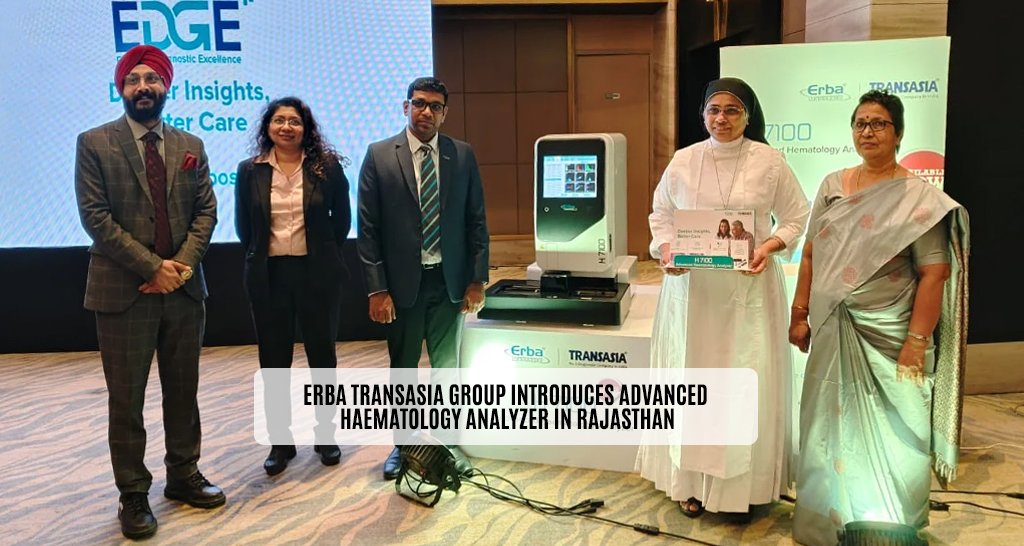Clinical Symposium held on “Deeper Insights in Haematology”; Erba H7100 brings hope for early and accurate diagnosis of blood disorders
Jaipur, February 12, 2025: Erba Transasia Group, India’s No. 1 In-vitro Diagnostic (IVD) Company and among the leading global IVD players focused on emerging markets, today introduced Erba H7100 – its advanced Haematology Analyzer at a Clinical Symposium held in Jaipur, Rajasthan on the theme “Need for High-End Haematology Analyzers to tackle current challenges faced by clinical laboratories.” Dr. Swati Pai – Consultant Haematopathologist, Manipal Hospitals, delivered the keynote address, joined by an expert panel that included Dr. Nidhi Sharma, Faculty – Advanced Haematology and HLA Lab, SMS Medical College and Hospital, Dr. Sameer Agarwal, Consultant Pathologist and Lab Director, Precision Path Lab; Dr. Shashi Bansal, Senior Consultant Pathologist, Bhagwan Mahaveer Cancer Hospital; Dr. Vishnu Kumar Sharma, Haematologist, Haemato-oncologist, Bone Marrow Transplant Physician at SMS Medical College and Hospital; and Dr. Subodh Kumar Gupta, Consultant Pathologist and Lab Director at Eskay Lab who was the Guest of Honour and Moderator for the Panel Discussion.
Rajasthan has been committed to early detection of cancer along with timely cure, according to Ms. Shubhra Singh, Additional Chief Secretary, Medical & Health and Family Welfare Department, Govt of Rajasthan. With cancer cases on the rise in the state, the government’s focus is on three main areas – oral, cervical and breast cancer. Plans are afoot to put in place measures for prevention, diagnosis and treatment of cancer. This underscores the need for advanced haematology analyzers.
Equipped with fluorescence flow cytometry technology, the Erba H7100 offers a 70-parameter range, including Reticulocytes, Immature Platelet Fraction (IPF), and Immature Granulocytes (IG). These parameters are essential for diagnosing and treating conditions such as anaemia, thrombocytopenia, infections, inflammation, and blood cancers.
Talking at the launch, Dr. Swati Pai said, “The state of Rajasthan’s diverse population and unique health concerns require precise diagnostic solutions like the Erba H7100. This analyzer is a step forward in addressing diagnostic gaps, especially for underserved communities battling genetic disorders.”
The Erba H7100 is a breakthrough in haematology diagnostics, redefining the field by enabling rapid, reliable insights for clinicians and enhancing diagnostic accuracy and research capabilities.
Talking about the new instrument, Suresh Vazirani, Founder Chairman, Erba Transasia Group, said, “Our commitment to advancing healthcare through innovation is exemplified in Erba H7100 Haematology Analyzer which stands out with its unique capabilities, providing an extensive panel of clinical and research parameters. Cost-effective and minimizing reagent usage, makes it ideal for large and medium-sized labs, corporate hospitals and B2B labs. We are confident Erba H7100 will revolutionize haematology diagnostics, providing clinicians with the tools they need to drive better outcomes.”
Elaborating further, Vijay Kumar, CCO and Country Head, Transasia Bio-Medicals Ltd. Said: “Erba H7100 set itself apart with a throughput of 90 tests per hour for CBC+diff and 70 tests per hour for CBC+Diff+retics. Fully automated, it can become a 2X system by adding additional units and samplers. Its Mentzer Index feature helps differentiate between Iron Deficiency Anemia (IDA) and Beta Thalassemia while its Optical Platelet (Plt-O) feature addresses challenges like pseudo-thrombocytopenia in haematological analysis. Optical platelet count reduces the spurious count and is useful in correcting spurious low platelet counts in EDTA-PTCP patients. By addressing many challenges that labs and pathologists face, we help healthcare professionals deliver patients, the best possible care.”
A key focus of the symposium was the clinical significance of incorporating reticulocyte parameters into haematology analyzers allowing clinicians to differentiate between various types of anaemia, classify them based on underlying mechanisms and customize treatment strategies accordingly. These advanced parameters also aid in assessing the effectiveness of interventions like iron therapy, erythropoietin administration and blood transfusions, ultimately enhancing patient care. The symposium highlighted the prognostic value of reticulocyte parameters in conditions like chronic kidney disease, chemotherapy-induced anaemia and haematological malignancies. Monitoring these parameters is vital in evaluating disease progression, predicting complications, and adjusting treatment regimens. In clinical laboratories, the integration of these advanced parameters leads to faster, more accurate diagnostics and improved efficiency, streamlining workflows and reducing turnaround time. Haematology analyzers are extensively used in patient and research settings to count and characterize blood cells for disease detection and monitoring.
